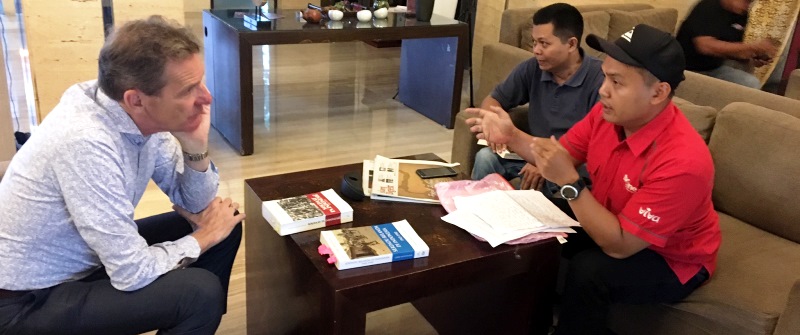
20 Sep Blog: Talking about Dutch war crimes with Indonesian audiences
By Gert Oostindie
Last year, Gert Oostindie published a book about the Dutch military in the Indonesian Revolution. He is now touring with Ireen Hoogenboom, who contributed greatly to the book, in Indonesia to promote the translated edition, Serdadu Belanda di Indonesia, 1945-1950. There has been a lot of interest, and as well as some emotional encounters.
Last year, we published a book about the Indonesian Revolution, based on 100,000 pages of ego documents such as letters and diaries produced by Dutch veterans. There is a heated debate in the Netherlands about the war, particularly about war crimes. In Soldaat in Indonesië, 1945-1950, I argue that there were probably tens of thousands of war crimes.
On the initiative of Obor publishers and KITLV-Jakarta, an Indonesian edition has just been published. Between the 13th and 26th of September, Ireen Hoogenboom and I, accompanied by Obor’s Andreas Haryono, are touring Java, Kalimantan, and Bali to present the book to the Indonesian public. We’ve had a hectic program, moving from one city to the next nearly daily, while squeezing in interviews with Kompas, Historia and TV One. We’re about halfway now, so it’s time for some first impressions.
We weren’t sure what to expect. In the Netherlands, the book showed that the official Dutch position formulated in 1969, that ‘excessive violence’ was exceptional, was untrue. But of course, this is not particularly new to an Indonesian audience.
What about our audiences, (comprised mainly university staff and students)? They are eager to hear more about ‘the other side’. Many stress that they value the ‘history from below’ approach of the book and that they feel the war should be understood beyond the binary caricatures – good Indonesians, bad Dutch – they grew up with. Many of the questions fired at us by audiences – usually totaling well over 100 – reflect an eagerness to know more about the Dutch, then and now. Why didn’t they see the war was doomed from the start? Did all soldiers agree with the Dutch war efforts, and how did they feel about mass violence? What are the younger generations’ feelings? How was the book received in the Netherlands?
Other questions demonstrate a growing awareness of the complexities of the war. Were there really Indonesians fighting on the Dutch side? How come Dutch soldiers reported on different enemy factions – nationalists, Darul Islam, Hizbollah, Communists, pemuda, criminal gangs? Why, if many soldiers hated the war, did they commit violence? Have Indonesian governments really declared time and again that they’d rather look ahead with the Dutch towards the future than backwards to this war and the many delicate issues that come with it?
And finally, there is a marked interest in methodological issues and the possibilities for future research. The book is based on all published ego documents by Dutch veterans, over 700 titles giving voice to some 1,400 mostly low-ranking soldiers, the majority of whom were drafted. Our audiences frequently state that Indonesian historians should do similar research with Indonesian sources.
There were some emotional encounters. Youngsters recounted their grandfathers’ bitter remarks about the Dutch. But instead of expressing anger, our audiences are interested in understanding this painful past and learning of the – hesitant – Dutch recognition that this war should never have been waged in the first place. Particularly moving was the opening session at the Erasmushuis, at the Dutch embassy, a symbolic venue. Panellists were eminent historian Taufik Abdullah, Historia’s Bonnie Triyana, Abdul Wahid, author of the Preface to the Indonesian edition, and Anhar Gonggong, Professor of History at the Universitas Indonesia. Anhar’s father, two brothers, and uncle were killed during Captain Westerling’s infamous campaign in South Sulawesi. I anticipated his speech with some nervousness. Then came his opening line: ‘This book is a great relief for me.’ This was followed by a talk emphasizing the importance of Dutch recognition of war crimes as an indispensable and most welcome step towards healing. A thoroughly humbling experience.
(Gert Oostindie is director of KITLV and professor of History at Leiden University. He is presently supervising KITLV’s self-funded investigations on ‘Dutch Military Operations in Indonesia, 1945-1950’.)




stef scagliola
Posted at 14:13h, 21 SeptemberI am very curious to know, why there has never been a need for acknowledgement, compensation or apologies from the side of Indonesians, if half of your family is killed in the struggle for independence, as has been the case for Anhar Gonggong, why don’t you use your capacity for analyzing historical facts and position as established historian to document and bring to the fore such injustices? Is it the same kind of embarrassment that is felt by the academic elite in the Netherlands? It would be good to also discuss dominant academic cultures with Indonesian academics.